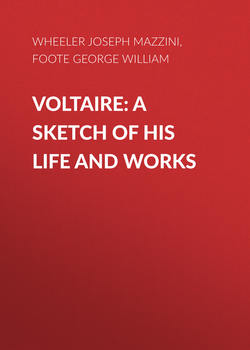Читать книгу Voltaire: A Sketch of His Life and Works - Foote George William - Страница 3
EARLY LIFE
ОглавлениеTwo hundred years ago, on November 21st, 1604, a child emerged on the world at Paris. The baptismal register on the following day gave the name François Marie Arouet, and the youth afterwards christened himself Voltaire.1 The flesh was so weakly that the babe was ondovc (the term employed for informal sprinkling with water at home), lest there might be no time for the ecclesiastical rite.
Something may have been wrong with the performance of the sacred ceremony, since the child certainly grew up to think more of “the world, the flesh, and the devil” than of the other trinity of Father, Son, and Holy Ghost. His father was a respectable attorney, and his mother came of noble family. His godfather and early preceptor was the Abbé de Chateauneuf, who made no pietist of him, but introduced him to his friend, the famous Ninon l'Enclos, the antiquated Aspasia who is said to have inspired a passion in the l’Abbé Gedouin at the age of eighty, and who was sufficiently struck with young Voltaire to leave him a legacy of two thousand francs, wherewith to provide himself a library.
Voltaire showed when quite a child an unsurpassed facility for verse-making. He was educated at a Jesuit college, and the followers of Jesus have ever since reproached him with Jesuitism. Possibly he did imbibe some of their “policy” in the propaganda of his ideas. Certainly he saw sufficient of the hypocrisy and immorality of religious professors to disgust him with the black business, and he said in after-life that the Jesuits had taught him nothing worth learning.
He learnt a certain amount of Latin and a parcel of stupidities. But, indifferent as this education was, it served to encourage his already marked literary tendency. Voltaire is said to have told his father when he left college, at the age of fifteen, “I wish to be a man of letters, and nothing else.” “That,” M. Arouet is reported to have replied, “is the profession of a man who wishes to be a burden to his family and to die of starvation.” He would have no such nonsense. Francois must study law; and to Paris he went with that intent. For three years he was supposed to do so, but he bestowed more attention on the gay society of the Temple, to which his godfather introduced him, “the most amusing fellow in the world,” and which was presided over by the Abbé de Chaulieu. The time which he was compelled to spend in law studies, and at the desk of a procureur, was by no means lost to his future fortunes, whether in the pursuit of fame or wealth. During that hated apprenticeship he doubtless caught up some knowledge of law and business, which stood him in good stead in after years. He tells us that his father thought him lost, because he mixed with good society and wrote verses. For these he got sufficient reputation to be first exiled to Tulle, then to Sully, and finally thrown into the Bastille on suspicion of having written lampoons on the government. The current story tells how the Regent, walking one day in the Palais Royal, met Voltaire, and accosted him by offering to bet that he would show him what he had never seen before. “What is that?” asked Voltaire. “The Bastille.” “Ah, monseigneur! I will take the Bastille as seen.” On the next morning, in May, 1717, Voltaire was arrested in his bedroom and lodged in the Bastille.
After nearly a year’s imprisonment, during which he gave the finishing touches to his tragedy of Œdipus, and sketched the epic Henriade, in which he depicts the massacre of Bartholomew, the horrors of religious bigotry, and the triumph of toleration under Henry IV., he was released and conducted to the Regent. While Voltaire awaited audience there was a thunderstorm. “Things could not go on worse,” he said aloud, “if there was a Regency above.” His conductor, introducing him to the Regent, said, repeating the remark, “I bring you a young man whom your Highness has just released from the Bastille, and whom you should send back again.” The Regent laughed, and promised, if he behaved well, to provide for him. “I thank your Highness for taking charge of my board,” returned Voltaire, “but I beseech you not to trouble yourself any more about my lodging.”
In his first play, Œdipe, appeared the celebrated couplet:
“Nos prêtres ne sont pas ce qu’un vain peuple pense!
Notre crédulité fait toute leur science.” 2
These lines were afterwards noted by Condorcet as “the first signal of a war, which not even the death of Voltaire could extinguish.” It was at this period that he first took the name of Arouet de Voltaire. He produced two more tragedies, Artemire and Mariamne; a comedy, The Babbler; and prepared his world-famous Henriade. A portrait, painted by Largillière at about this period, has often been engraved. It exhibits a handsome young gentleman, full of grace and spirit, with a smiling mouth, animated eyes, intellectual forehead, and a fine hand in a fine ruffle.
1
He was a younger son. The name Voltaire is, perhaps, an anagram of the Arouet 1. j. (le jeune) the u being converted into r, and the j into r. In like manner, an old college- tutor of his, Père Thoulié, transformed himself, by a similar anagrammatic process, into the Abbé Olivet – omitting the unnecessary h from his original name. This method of reforming a plebeian name into one more distinguished-looking seems not to have been uncommon in those times, as Jean Baptiste Pocquelin took the name of Molière, and Charles Secondât that of Montesquieu.
2
“Our priests are not what foolish people suppose; all their science is derived from our credulity.”
